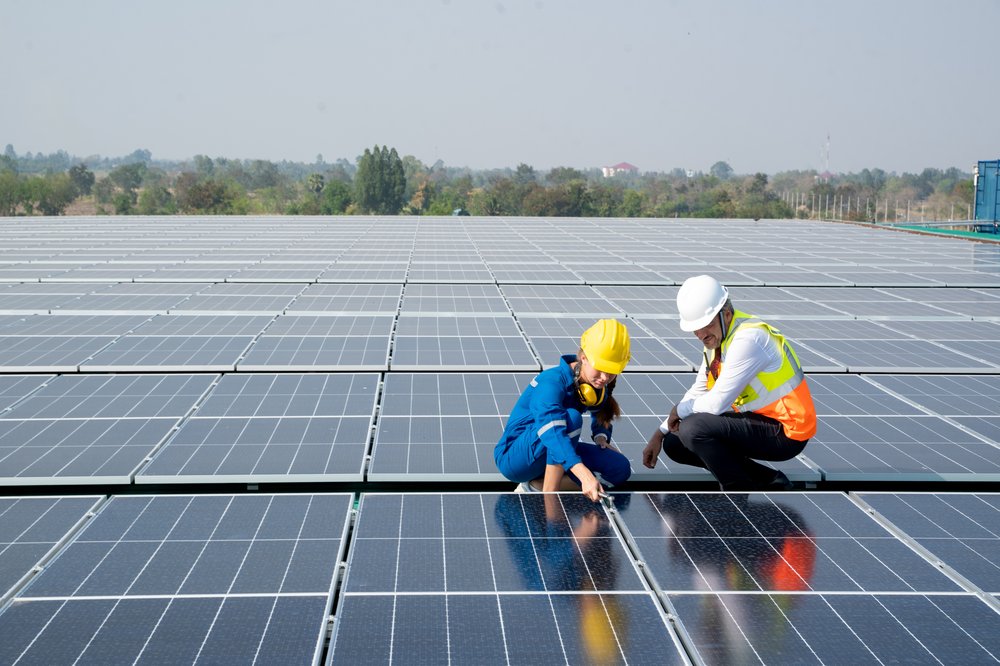What the landmark climate bill could mean for New Jersey as it tries to go green
Aug. 18, 2022, 11:01 a.m.
The bill sets aside $369 billion for initiatives like incentives to buy electric cars and electrify home heating.

The Inflation Reduction Act President Joe Biden signed this week addresses much more than economics. It also sets aside $369 billion over 10 years for clean energy and climate resiliency.
Tax credits will support renewable energy, like solar and wind, and the new law puts an emphasis on reducing pollution on some of the nation's poorest communities.
Ed Potosnak, the executive director of the New Jersey League of Conservation Voters, joined WNYC's Michael Hill on Morning Edition to discuss why that's of particular importance to New Jersey and the region.
The transcript of their discussion below has been lightly edited for clarity.
Michael Hill: We're coming up on the 10th anniversary of Hurricane Sandy, and we've seen the effects of powerful storms on our infrastructure, on our transportation and on our shoreline. Tell us a little bit about why fighting climate change is so important in this region.
Ed Potosnak: Well, we're seeing it right now — the effects of extreme heat. It's threatening our elderly, their health and the vulnerable New Jerseyans, and all the folks within our region, in New York as well. We're seeing the signs of a drought. They're asking us currently to hold up on our water usage. More intense and frequent storms, and not enough water. It comes kind of in two ways for us — too much water or too little water.
Hill: $369 billion over 10 years is a lot of money. How will most people benefit from those tax breaks and other incentives?
Potosnak: Mostly, what we're going to see is availability to switch over from fossil fuels and electrify. That would be electric vehicles, that would be home heating and cooling, like switching over to a heat pump. There are aggressive subsidies that will allow that to be cost-competitive and help us to reduce our energy and reduce climate pollution.
So in the case of electric vehicle incentives, it's capped at $55,000 for a regular consumer car. And it has a provision about where it needs to be made here in America in order to apply for that incentive. So, in fact, I think (automakers are) going be changing around how they're making the vehicles, where they're making the vehicles, to get to that price point. And it's actually going to drive down prices.
Hill: How can New Jersey make sure it's positioned well to see real-world impact from this law? For transparency, that could include investments in projects by New Jersey energy companies, some of which sponsor your organization.
Potosnak: Particularly, I think we have a massive opportunity in expanding our offshore wind. Industry and production right here in New Jersey was something the governor set up, called the New Jersey Wind Port. Those are good local jobs — high-paying, high-skilled — to make sure all the components of the wind turbines are made here at home as much as possible. And then of course, those wind turbines powering our homes and businesses and reducing climate impacts and the greenhouse gases that additionally cause cancer and asthma.
So I think we're at the front of the line compared to a lot of places in the country because we've embraced renewable and clean and green energy as part of the solution here in our state.
(Editor's note: The New Jersey Wind Port, about 20 miles off the coast of Atlantic City, is being built on land leased from PSE&G, one of the New Jersey Conservation League's sponsors).
Hill: We hear a lot about environmental justice, at making investments to lessen the impact of decades of pollution in low-income communities. How can this bill do that in New Jersey?
Potosnak: Well, there is $60 billion that's set aside for environmental justice. And this means that communities that are the most negatively impacted — communities of color — by the fossil fuel industry and sort of combined pollution from manufacturing and industrialization will have investments, so they can see the benefits of this transition to the clean energy economy.
If you live in Newark, you're four times more likely to have asthma than if you live 10 or 15 miles outside the city. And that's not right. And we can fix that.
Correction: An earlier version of this post misstated the name of the federal package it discusses. It is the Inflation Reduction Act.